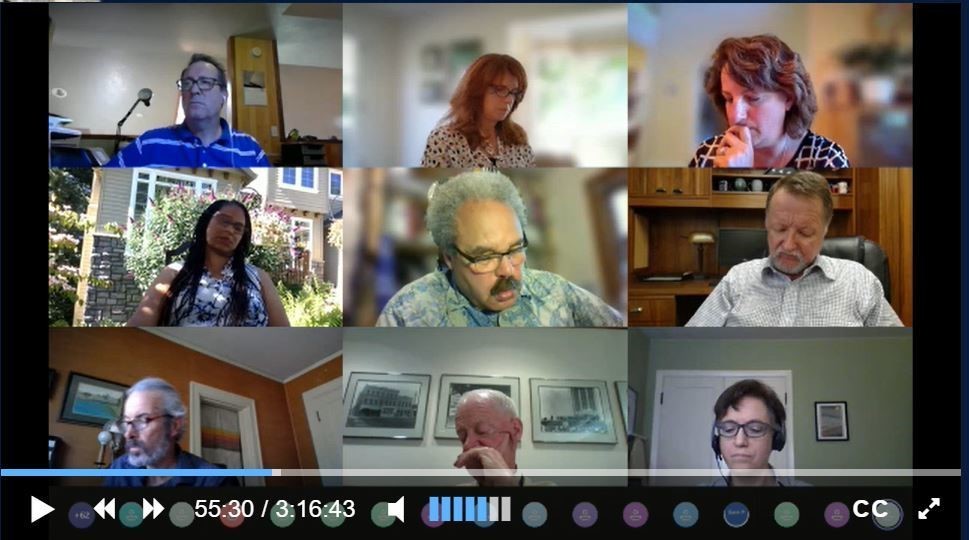By Representative David Gomberg, House District 10
I have just returned from a three day special or unscheduled legislative session in Salem.
Much has and will be written about this emergency session called by the Governor. Special sessions are infrequent and unusual in the first place. Usually they are called after broad agreement is reached on the issues to be considered.
Most times the topics are very focused. But this time more than 25 bills were brought forward on a wide variety of issues. The pace was stressful and at times confusing.
Finally, the building was closed to all but legislators and a few critical staff. Committee meetings were held electronically and testimony was taken by telephone. The public watched and participated from home and legislators watched while sitting alone in our offices. Masked members kept social distance as they rotated to the chamber to vote.
Certainly the process was not ideal. But it worked.
Remote committee meeting

Members of the Joint Committee on the First Special Session of 2020 meet remotely
To understand the June Special Session, you must begin with the stunning collapse of the regular February “short” session. Members had walked-out in protest and the process ended without result. That meant a number of necessary bills needed to be addressed as soon as we reconvened.
Within weeks, COVID devastated our health and our economy. The Governor implemented dozens of executive orders. But in some cases, the Legislature needed to act, changing statutes to address the crisis.
And finally, as national and local emotions surged in response to ongoing acts of racial injustice, Oregon responded with proposals to reform police practices and accountability.
Most of the details were previewed by a Joint Special Committee On Coronavirus Response and finalized by the Joint Interim Committee On The First Special Session of 2020.
As the session got underway, I worked on a proposal not on the agenda.
Local businesses, schools, colleges and governments are taking steps to keep customers, students, and employees safe. But they are concerned that, even when they follow best practices and current rules, they could be sued by anyone that becomes ill.
I raised this issue as we prepared for session and then took the unusual step of authoring a letter to legislative leadership, signed by ten House Democrats, asking for amendments allowing liability waivers. The Republican caucus supported these proposals. I then co-authored an amendment with coastal representative Caddy McKeown.
Although the amendment was not adopted, ultimately we convinced leadership to form a task force and prepare a proposal for our next session.
Here are some highlights of measures that passed, almost always with broad bi-partisan support.
Police Accountability and Free Speech: Championed by the Legislature’s People of Color (POC) Caucus, a historic package of police accountability measures tackled a variety of issues, from the use of tear gas and chokeholds to transparency in police discipline records.
Outlaw the use of respiratory restricting restraints – House Bill 4203A
Duty to report and intervene in response to misconduct – House Bill 4205A
Transparency of police discipline records – House Bill 4207A
Protecting freedom of speech and assembly from excessive force – HB 4208A
Committee on Transparent Policing and Use of Force Reform – House Bill 4201A
Discipline guidelines and arbitration decisions – SB 1604
Rural Broadband Internet: Senate Bill 1603 establishes the Broadband Fund to support projects for planning or developing broadband service infrastructure, and for the administration of the Oregon Broadband Office. It subjects the sale of all retail telecommunications services to the universal service fund surcharge.
Business Oregon estimates 21% of urban residents, and about 43% of rural ones have no internet, or services that are well below minimal FCC standards. Across the state we have more than 50 schools with no or inadequate broadband, and about a third of our public libraries fail to meet FCC residential broadband standards. Due to our challenging geography, much of the coast is a broadband desert. Yet reliable access to the internet will be essential to our coastal recovery.
Currently, broadband costs are being paid by taxes on telephone landlines. But as more people shifted to untaxed cell service, costs have been increasingly borne by lower-income and older Oregonians. This surcharge change adds cell phone users to the pool of those paying in. Cell phone costs may increase by about $4 a year. It will reduce the cost of a landline by about $12 a year.
Fixes to the Corporate Activity Tax (CAT): HB 4202 approved a series of technical fixes to the Student Success Act adopted in 2019. Significantly that included exempting all sales of milk whether to co-ops or other buyers.
Last session I proposed exempting all agriculture from the CAT. That bill failed to advance but I plan to bring it back in 2021.
Protections for Forests and Clean Water: Senate Bill 1602, which substantially improves clean water protections for Oregon’s forest communities and enshrines the commitment made by Oregon’s timber industry and major environmental groups to collaborate on a course forward to establish science-based forest management in Oregon.
Senate Bill 1602 will protect Oregon’s rural communities by prohibiting the application of aerial pesticides near homes and schools that harm human health. The bill also strengthens protection of waterways, specifically salmon, steelhead and bull trout streams, by creating buffers where logging and aerial spraying is deemed harmful to waterways and wildlife. The bill also includes the formalization of an agreement between environmental groups and the logging industry to continue productive discussions about modernizing Oregon’s forest practice laws.
COVID-19 Response Legislation: The omnibus House Bill 4212 covers a variety of areas to support public health, individuals, local governments, courts and businesses during the COVID-19 pandemic.
Emergency shelter siting – Temporarily waives zoning regulations for local governments to create shelters and support for Oregonians experiencing homelessness and at high-risk of virus transmission. Siting provisions are limited to 90 days.
Remote notary provisions – Authorizes a pilot program to allow notaries to perform work using electronic technology.
Enterprise zone deadline extension – Delays the June 30 expiration date of enterprise zones in the state by six months.
Individual development account funds for pandemic relief – Provides flexibility for individual development accounts to be used for necessary medical expenses, to avoid eviction and for living expenses after the loss of a job during the pandemic.
COVID-19 race and ethnicity data – Requires health care providers to collect data on race, ethnicity, preferred spoken and written languages, English proficiency, interpreter needs and disability status for health services related to COVID-19. Data is confidential and used for public health purposes.
Safe public meetings – Allows local governments and other public bodies to hold virtual meetings so they can continue to provide essential services and make decisions, while protecting public health.
CARES Act payment protection – Protects vulnerable Oregonians who receive CARES Act Recovery Rebate payments having portions of those payments withheld or garnished, so all relief money can be used to pay for essential needs like housing, food and medical needs. Payments are protected until September 30, 2020.
Safe court proceedings – Gives the Chief Justice the authority in certain circumstances to extend statutory deadlines for court appearances if the COVID-19 pandemic results in delay of court processes.
Temporary Physician Assistant Authorization – Physician Assistants (PA) are given flexibility during the emergency period to expand their scope of practice.
Foreclosure and Eviction Protections: House Bill 4213A extends the moratorium on both commercial and residential evictions through September 30, 2020 and creates a six-month repayment grace period after the moratorium ends for tenants to repay their back rent accrued during the moratorium. House Bill 4204A directs lenders to defer or forbear residential and commercial mortgage payments until September 30, 2020, if a borrower is unable to pay due to the COVID-19 pandemic. Deferred payments would be due at the end of the loan, at the same lending terms as in place during the emergency period.
I had great concerns that prohibiting evictions for non-payment would harm our small landlords. I had planned to vote against the bill until a number of protections were added and a similar measure passed protecting property owners from foreclosure. Without these bills, the Governor would likely have extended broader eviction rules now in place. The measure was supported by landlord and tenant organizations and banks and credit unions. Ultimately it passed with strong Democrat and Republican votes.
I continue to believe these measures would not be necessary if unemployment compensation were effectively being delivered to everyone qualified for benefits. But the ongoing failure of the Employment Division to process claims gives us little choice. I can only hope that funds already allocated for rent support which I voted for in the Emergency Board will reduce the number of rent crisis cases.
It is critical in this moment that we make sure Oregonians can stay in their homes. Halting foreclosures and evictions is key to make sure everyone will be able to recover from this pandemic. No one should have to worry about whether or not they have a roof over their head, or whether they’ll be able to keep the roof over their head.
If you are having problems paying rent, or if you have a tenant that has not made payments, call 211 or a local Community Action Agency. Funds, when approved, are sent direct to the landlord.
Special Session Fast Facts
This is the 42nd special session in Oregon history.
The first occurred in 1860, the most recent in 2018.
The longest ever special session lasted 37 days in 1982.
The record for the most held in one year was five in 2002.
There have been three special sessions since the implementation of annual sessions in 2010 (2012, 2013, 2018).
The state’s budget shortfall must also be addressed soon. I am urging the Federal government to pass another coronavirus relief package to help state and local governments before the Legislature convenes to rebalance the budget in another special session. We are committed to protecting vital social services and education, and the scale of this financial crisis demands more federal action.
These are unprecedented times. The COVID-19 pandemic has taken an enormous toll on Oregon’s economy and public health. The measures taken up in this special session will protect access to health care, prevent evictions and foreclosures during the pandemic and take significant steps to improve police accountability. But we have more to do.
Stay safe. Stay well. And as I always remind you, please be kind and patient with others.
email: Rep.DavidGomberg@oregonlegislature.gov
phone: 503-986-1410
address: 900 Court St NE, H-471, Salem, OR, 97301
website: http://www.oregonlegislature.gov/gomberg


.png)